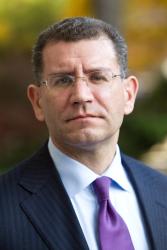Introduction
With the failure of the Camp David final status negotiations and the outbreak of large-scale violence in late 2000, Israel and the Palestinians descended into a crisis that threatens to undermine the chances of peaceful resolution for years to come. The two sides have reached an apparent impasse, with violence and retribution supplanting dialogue and negotiation as driving principles of Israeli-Palestinian relations. The diplomatic efforts of the United States and others have had little success in ending the violence or restarting negotiations, and the very viability of the peace process begun at Oslo now seems in grave doubt.
The purpose of The Israeli-Palestinian Workshop, established in Washington, D.C., under the auspices of the Saban Center for Middle East Policy at The Brookings Institution, is to promote an institutional dialogue between Israelis, Palestinians, and Americans to find new ways of promoting a halt to the violence, a return to serious negotiations, and a final settlement of the conflict.
Participants in the Workshop include former negotiators, former and current government officials, and policy experts involved in the peace process. In the first Workshop, held at The Meridian House on November 14–16, 2002, concept papers were presented on three topics: the requirements for Palestinian state building; Israeli security requirements in a future peace settlement; and new mechanisms for resolving the conflict, such as an international trusteeship for Palestine. The basic purpose was to come up with ways to reconcile Palestinian requirements for an independent, viable, and democratic state with Israeli requirements for security and existence as a Jewish state.
At a time when relations between Israelis and Palestinians are characterized by violence, mistrust, and hatred, the first Workshop was able to promote a constructive and open exchange of ideas on the complex issues involved in resolving the Israeli- Palestinian conflict.
The following report on the first Workshop summarizes the views that emerged from both the presentations and the ensuing discussion sessions. In keeping with the Workshop’s goal of fostering open and frank discussion, the report avoids attributing specific opinions or remarks to the individuals who participated, except for those who presented papers.
View Full Paper (PDF—163kb). Get Adobe Acrobat Reader
The Brookings Institution is committed to quality, independence, and impact.
We are supported by a diverse array of funders. In line with our values and policies, each Brookings publication represents the sole views of its author(s).




